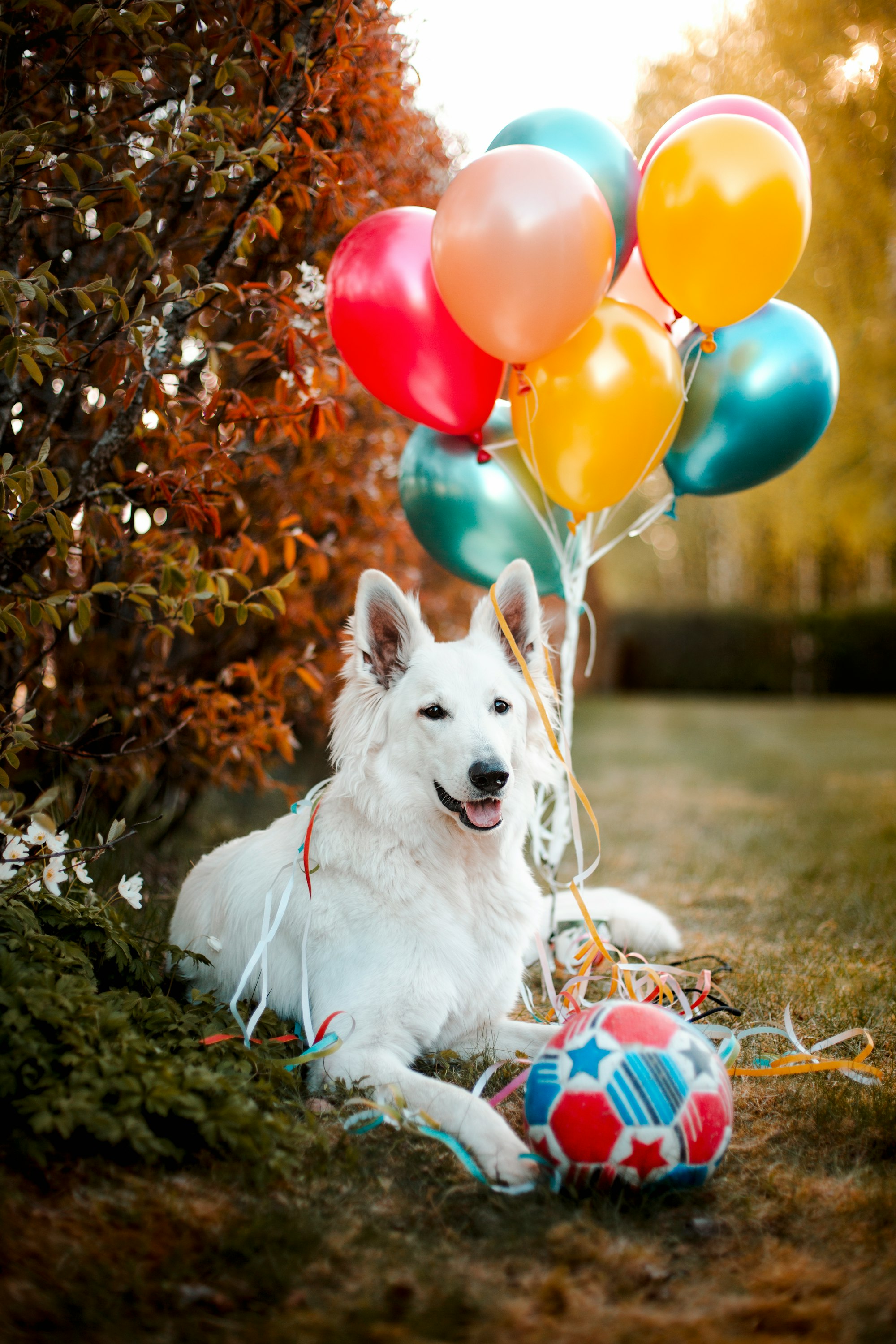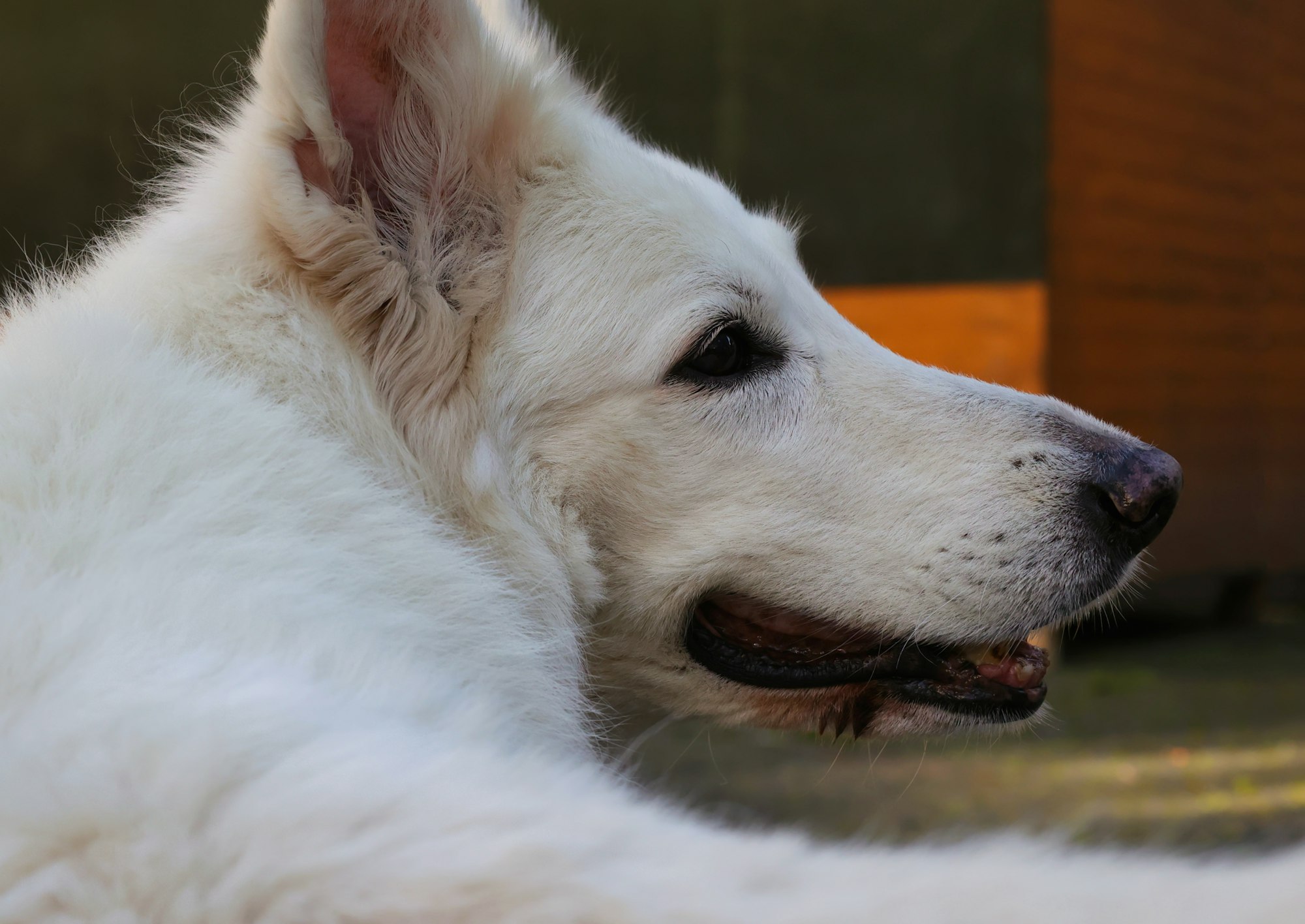Mastering the art of training and bonding with your White Swiss Shepherd experience begins with understanding the breed. The White Swiss Shepherd, also known as the Berger Blanc Suisse, is a striking and elegant breed. These dogs are known for their intelligence, loyalty, and incredible work ethic.
To truly bond with your White Swiss Shepherd, it's essential to understand their unique characteristics and use them as the foundation for your training methods.
Understanding the White Swiss Shepherd Temperament
The White Swiss Shepherd is known for being highly intelligent, eager to please, and incredibly loyal. These traits make them ideal candidates for a variety of dog sports and working roles, such as search and rescue, therapy dogs, and service dogs. Their versatility is one of the many reasons people are drawn to this breed.
The strong bond between a White Swiss Shepherd and its owner often begins with understanding their temperament. These dogs are typically friendly, confident, and social animals. They are known to be good with children and other pets, making them excellent family companions. However, it's important to remember that each dog is an individual, and their personalities can vary.

The Importance of Early Socialization and Training
To make the most of your White Swiss Shepherd experience, early socialization and training are crucial. This helps ensure that your dog grows up to be well-rounded, well-behaved, and adaptable to various situations. Begin socialization as soon as your puppy is vaccinated and cleared by your veterinarian. Expose your dog to different environments, people, and other animals. This will help them become confident and comfortable in various situations.
Training should also begin early on in your White Swiss Shepherd's life. These intelligent dogs are quick learners, and you'll find that they pick up on new commands and skills easily. Use positive reinforcement methods, such as treats and praise, to encourage and reward good behavior. Remember that consistency is key when it comes to training – make sure to practice regularly and maintain the same rules and expectations.
Establishing a Strong Bond with Your White Swiss Shepherd
A strong bond with your White Swiss Shepherd is essential for both your happiness and your dog's well-being. Building trust and a deep connection with your dog takes time, patience, and dedication. Here are some tips to help you establish a strong bond with your White Swiss Shepherd:
- Spend quality time together: Spend time playing, training, and cuddling with your dog daily. This will strengthen your bond and help your dog understand that you are their primary source of love, support, and guidance.
- Consistent training: As mentioned earlier, consistency is key when it comes to training. By maintaining a consistent training routine, your White Swiss Shepherd will learn to trust and respect you as their leader.
- Communication: Learn to read your dog's body language and understand their needs. This will help you respond to their needs effectively, creating a mutual understanding and a deeper bond.
- Exercise and mental stimulation: Keep your White Swiss Shepherd physically and mentally challenged by providing regular exercise and engaging activities like puzzle toys. This will not only strengthen your bond but also keep your dog happy and healthy.
Always make sure to keep track of your pup, especially during training. You can use a Fi Smart Dog Collar to watch their location and keep track of daily exercise.

Overcoming Common Training Challenges
While the White Swiss Shepherd is a highly trainable breed, you may encounter some challenges during your training journey. Here are some common issues and tips on how to overcome them:
- Stubbornness: While the White Swiss Shepherd is intelligent and eager to please, they can sometimes be stubborn. Patience and consistency are key in these situations. If your dog isn't responding to a command, take a step back and assess the situation. Make sure your commands are clear and that you're using positive reinforcement to encourage desired behaviors.
- Separation anxiety: White Swiss Shepherds are known for their loyalty and strong attachment to their owners. This can sometimes result in separation anxiety when left alone. To help prevent this issue, gradually increase the amount of time you leave your dog alone and provide them with activities to keep them occupied while you're away.
- Socialization challenges: Some White Swiss Shepherds may be more reserved or timid in new situations. To overcome this challenge, make sure to expose your dog to various environments and social situations from a young age. Positive reinforcement can help encourage confidence in these situations.
- High energy levels: White Swiss Shepherds are an active breed and require regular exercise and mental stimulation. If your dog isn't receiving enough physical activity, they may become restless and more challenging to train. Ensure you provide your dog with ample opportunities to burn off energy through walks, playtime, and engaging activities.
Advanced Training and Dog Sports
Once you have established a solid foundation of basic obedience and have built a strong bond with your White Swiss Shepherd, you may want to consider more advanced training and dog sports. These activities can provide additional mental and physical stimulation for your dog while further strengthening your bond. Some popular dog sports and activities for White Swiss Shepherds include:
- Agility: This fast-paced sport involves your dog navigating a course of obstacles, such as jumps, tunnels, and weave poles, as quickly and accurately as possible. Agility training can help improve your dog's focus, coordination, and confidence.
- Obedience trials: In obedience competitions, your dog will perform a series of commands and exercises, such as heeling, retrieving, and scent discrimination. Participating in obedience trials can help refine your dog's training skills and showcase their intelligence.
- Herding: The White Swiss Shepherd's ancestors were working dogs with strong herding instincts. Some White Swiss Shepherds may enjoy participating in herding trials, where they demonstrate their ability to control and move livestock.
- Search and rescue (SAR): White Swiss Shepherds are known for their strong work ethic, intelligence, and keen sense of smell. These traits make them excellent candidates for search and rescue work. Training in SAR can provide your dog with a sense of purpose while helping others in need.
The Importance of Proper Nutrition and Healthcare
Another essential aspect of mastering the art of training and bonding with your White Swiss Shepherd is ensuring that they receive proper nutrition and healthcare. A well-balanced diet and regular veterinary care will keep your dog healthy, which in turn supports their ability to learn and engage in training.
- Nutrition: Choose a high-quality, well-balanced dog food that meets your White Swiss Shepherd's specific nutritional needs. This may vary based on their age, size, and activity level. Consult with your veterinarian for personalized recommendations on the best food for your dog.
- Regular veterinary care: Schedule regular check-ups with your veterinarian to ensure that your White Swiss Shepherd stays in optimal health. Your veterinarian will help you stay on top of vaccinations, parasite prevention, and any potential health issues that may arise.
- Dental care: Don't forget about your dog's dental health. Regular teeth brushing and dental cleanings can help prevent dental issues like tooth decay and contribute to your dog's overall well-being.

Building a Supportive Environment
Creating a supportive and nurturing environment for your White Swiss Shepherd is another vital aspect of bonding and training. A comfortable and safe home will help your dog feel secure and confident, which can positively impact their training progress.
- Provide a designated space: Your White Swiss Shepherd should have a designated space within your home where they can rest and feel secure. This could be a crate, a dog bed, or a designated room.
- Establish a routine: Dogs thrive on routine and consistency. Establishing a daily routine for feeding, exercise, and training will help your White Swiss Shepherd feel secure and understand what is expected of them.
- Positive reinforcement: Remember to always use positive reinforcement when training your White Swiss Shepherd. This approach fosters a stronger bond between you and your dog and encourages them to continue learning.
The Lifelong Journey of Training and Bonding
Mastering the art of training and bonding with your White Swiss Shepherd is a lifelong journey. As your dog grows and develops, their needs and abilities may change. Continuously adapt your training methods and activities to keep your dog engaged, challenged, and happy.
Remember that patience, consistency, and understanding are key to building a strong bond with your White Swiss Shepherd. Celebrate your successes together and always be open to learning and growing as a team. Your dedication and commitment to your White Swiss Shepherd's well-being and happiness will create a fulfilling and rewarding experience for both of you.
Dealing with Behavioral Issues
As you work on mastering the art of training and bonding with your White Swiss Shepherd, it's important to be prepared to address any potential behavioral issues that may arise. By addressing these issues early on, you can prevent them from becoming more serious problems and maintain a strong bond with your dog.
- Barking: Excessive barking can be a common issue with many dog breeds, including White Swiss Shepherds. Determine the root cause of the barking, such as boredom, fear, or territorial behavior, and address it accordingly. Training techniques, such as teaching the "quiet" command, can be helpful in managing barking issues.
- Jumping: White Swiss Shepherds may be prone to jumping on people as a form of greeting. To prevent this behavior, teach your dog to sit and stay when greeting guests. Reward your dog with praise and treats for remaining calm and keeping all four paws on the ground.
- Resource guarding: Some dogs may display resource guarding behavior, which involves protecting their food, toys, or other possessions. This behavior can be managed by teaching your dog the "leave it" command and gradually desensitizing them to the presence of other people or animals near their resources.
- Leash pulling: To prevent leash pulling, teach your White Swiss Shepherd to walk politely on a loose leash. This can be achieved through training techniques such as the "turn-around" method, where you change directions whenever your dog starts pulling.

Coping with Aging and Health Issues
As your White Swiss Shepherd grows older, their needs and abilities may change. It's essential to adapt your training and bonding activities to accommodate your dog's changing needs, ensuring that they remain happy and healthy throughout their life.
- Adjusting exercise routines: Older dogs may require less intense exercise due to joint issues or decreased energy levels. Adapt your exercise routine to accommodate your dog's needs, and consider incorporating low-impact activities such as swimming or gentle walks.
- Mental stimulation for senior dogs: Just like humans, dogs can experience cognitive decline as they age. Continue to provide mental stimulation for your senior White Swiss Shepherd through puzzle toys, scent games, and short training sessions to keep their mind sharp.
- Regular veterinary check-ups: As your White Swiss Shepherd ages, it's important to schedule more frequent veterinary check-ups to monitor their health closely. Your veterinarian can help identify any potential health issues early on and provide guidance on how to best support your dog's well-being as they age.
Celebrating Your Unique White Swiss Shepherd Experience
Mastering the art of training and bonding with your White Swiss Shepherd is a deeply personal and unique journey. Each dog is an individual, and your experiences together will be shaped by your dog's personality, your own approach to training, and the strong bond that you create together.
Take the time to appreciate the special moments and milestones that you share with your White Swiss Shepherd. Cherish the memories you create together and celebrate the unique relationship that you have with your dog.
In a Nutshell
Building a strong bond and mastering the art of training with your White Swiss Shepherd requires patience, understanding, and dedication. By providing a supportive environment, proper nutrition, and healthcare, and engaging in activities that challenge and stimulate your dog both physically and mentally, you will create a lasting and fulfilling relationship with your White Swiss Shepherd. Embrace the challenges, celebrate the successes, and enjoy the incredible journey of training and bonding with your White Swiss Shepherd.
For more helpful articles about pet-parenting tips, check out the Off Leash blog at TryFi.com.
Want to know more about TryFi.com? The Fi Dog Collar is a GPS tracking collar that not only keeps track of your dog’s location, activity levels, and sleep patterns, but it also alerts you if your dog escapes your backyard. This is the fastest way to find your dog after an escape. Try the Fi Dog Collar today!






